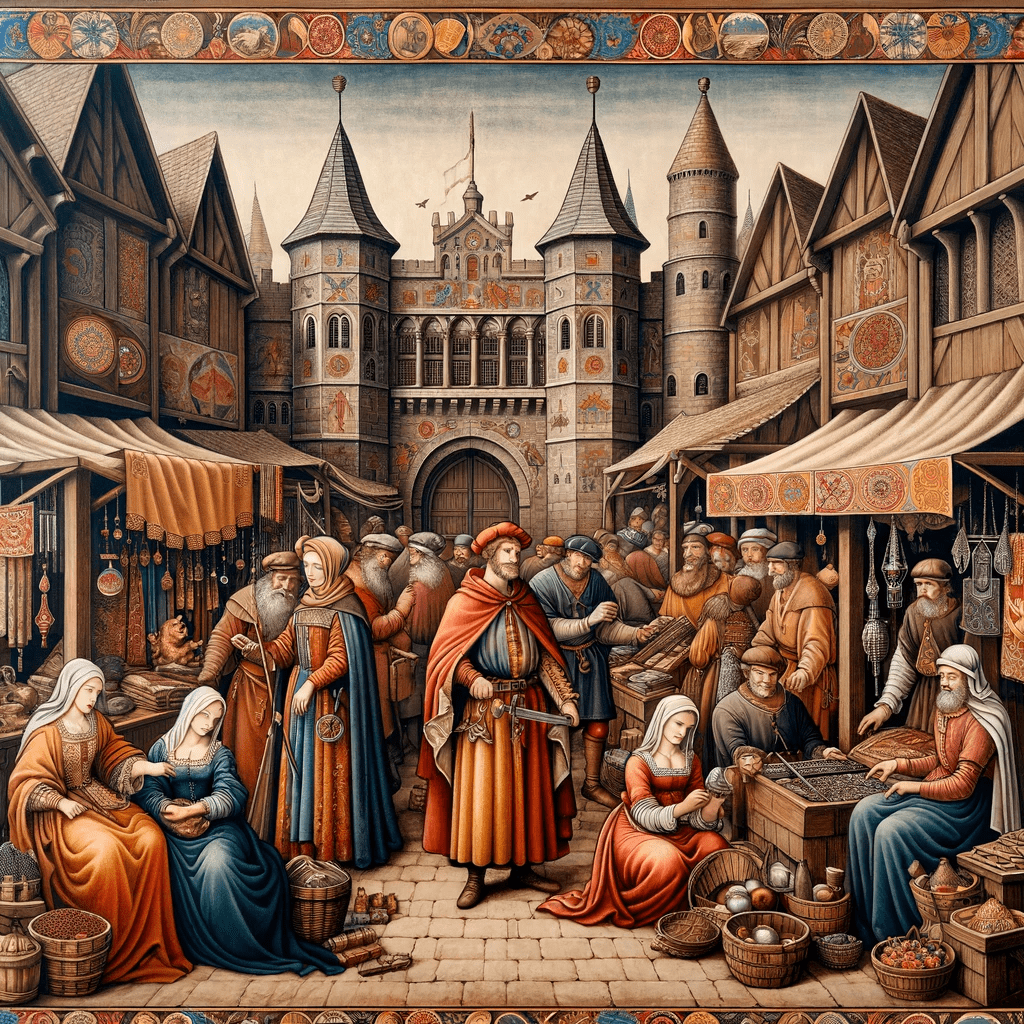Introduction to Medieval Economy
The economy during the medieval ages was a fascinating and complex system, significantly influenced by trade, agriculture, and craftsmanship. One of the key players in the medieval economy were the medieval merchants. Their role in shaping the economic landscape of the period cannot be overstated.
The Role of Merchants in Medieval Economy
In the medieval economy, merchants played a crucial role as intermediaries in trade. They were responsible for buying goods from producers, transporting these goods along medieval trade routes, and selling them in medieval markets and fairs. This process of trade was vital for the distribution of goods and commodities, contributing to the growth and prosperity of towns and cities.
The success of the merchants was often determined by their ability to navigate the complex trade systems, their understanding of medieval currency, and their skill in negotiating and forming alliances. By controlling the flow of goods, medieval merchants wielded significant economic power, influencing prices and availability of products.
Additionally, the influence of the merchants extended beyond trade. They often invested in various medieval industries, such as textile production, mining, and agriculture, further enhancing their economic influence.
The Origin of Merchants in Medieval Times
The emergence of merchants in medieval times can be traced back to the early Middle Ages, when trade began to expand due to increased agricultural production. As villages grew into bustling towns, the demand for goods, both locally produced and imported, increased. This growth in trade gave rise to a new social class – the merchants.
Initially, most medieval merchants were locals who traded in goods within their own towns. However, as trade networks expanded, some merchants began to specialize in long-distance trade, traveling to distant lands to exchange goods. These merchants brought back not only foreign goods but also new ideas and innovations, contributing to the cultural and intellectual development of medieval society.
Understanding the role and origin of medieval merchants is crucial for a comprehensive understanding of the medieval economy. As you delve deeper into this topic, you’ll discover the significant impact these merchants had on shaping the economic, political, and social landscape of the medieval times.

The Rise of Medieval Merchants
In the Middle Ages, the merchant class underwent a significant transformation. Their rise to prominence was influenced by a combination of factors and had far-reaching impacts on the medieval economy and society.
Factors Affecting the Rise
Several key factors contributed to the rise of medieval merchants. The growth of towns and cities led to an increased demand for goods, which merchants were able to supply. Moreover, advancements in transportation allowed for the expansion of trade routes, enabling the movement of goods over greater distances.
| Factor | Impact |
|---|---|
| Growth of Towns | Increased demand for goods |
| Transportation Advancements | Expanded trade routes |
| Development of Currency | Facilitated trade |
The development of currency was another crucial factor. With the introduction of medieval currency, trade became more standardized, and the economic power of merchants grew.
The Role of Trade and Commerce
Trade and commerce played a significant role in the rise of the merchant class. As trade routes expanded and markets grew more complex, the role of merchants became increasingly important. They served as intermediaries, purchasing goods from producers and selling them to consumers in medieval markets and fairs.
Merchants also played a crucial role in the development of medieval industries. They invested in production and facilitated the exchange of goods, leading to the growth of industries such as wool and cloth production.
The Impact of the Crusades
The Crusades, a series of religious wars in the Middle Ages, also had a profound impact on the rise of the merchant class. These expeditions led to the opening of new medieval trade routes to the East, increasing the demand for exotic goods such as spices, silks, and precious metals.
The Crusades also led to an increased demand for military supplies, providing another lucrative business opportunity for merchants. They capitalized on these opportunities to amass wealth and influence, further solidifying their position in society.
| Crusades Impact | Result |
|---|---|
| New Trade Routes | Increased demand for exotic goods |
| Increased Military Demand | Increased demand for military supplies |
The rise of the medieval merchants marked a significant shift in the medieval economy. Their influence extended beyond commerce, impacting politics, society, and culture. Through trade and commerce, they not only reshaped the economic landscape but also played a crucial role in the development of the modern world.
Power and Influence of the Medieval Merchants
The medieval merchants were not just traders but also influential figures in the society. Their power and influence were reflected in the economic, political, and social spheres of the medieval times.
Economic Power of the Merchants
Merchants held significant economic power during the medieval times. Their wealth often surpassed that of nobles and knights, positioning them as key players in the medieval economy. They dominated the trade industry, controlling major medieval trade routes and establishing medieval markets and fairs.
Moreover, they played a crucial role in the development of medieval currency, which further enhanced their control over the economy. They also invested in various medieval industries, such as wool, wine, and timber, thereby expanding their wealth and influence.
Political Influence of the Merchants
The economic power of the medieval merchants often translated into political influence. They used their wealth to gain favor with the ruling class, often providing financial support to kings and lords in exchange for privileges and rights.
Their influence also extended to local governments, where they often held positions of authority. They played a crucial role in the development of laws and regulations related to trade and commerce, shaping the economic policies of the medieval era.
Social Status and Recognition
In addition to their economic and political influence, the medieval merchants also enjoyed high social status and recognition. Despite initially being viewed as lower class citizens, their persistent rise in wealth and power led to their acceptance among the nobility.
Their social status was often reflected in their lifestyles. They lived in lavish houses, wore expensive clothes, and had access to luxuries that were typically reserved for the nobility. In fact, the rise of the merchant class is often credited as a significant factor in the social mobility that characterized the late medieval period.
In conclusion, the medieval merchants held significant power and influence during the medieval times. Their role extended beyond the economic sphere, impacting the political and social fabric of the society. Their legacy continues to be felt today, providing a testament to the pivotal role of trade and commerce in societal development.
Challenges Faced by Medieval Merchants
The life of medieval merchants wasn’t always about wielding economic power and influence. They faced numerous challenges that made their role in the medieval economy quite demanding. These included difficulties with trade and travel, dealing with the feudal system, and the various risks and threats they encountered.
Trade and Travel Difficulties
Trade and travel were integral parts of a merchant’s life in medieval times. However, they were fraught with numerous difficulties. Traveling was slow and cumbersome due to poor road conditions. Traders often had to contend with dangerous terrains, unpredictable weather, and the risk of bandit attacks.
Transporting goods over long distances was a challenging endeavor. The lack of standardized weights and measures made it difficult to evaluate and compare goods, and the absence of a consistent medieval currency complicated financial transactions. These factors often made trade a risky and unpredictable business.
Furthermore, merchants had to navigate medieval trade routes that were often poorly mapped and lacked road signs. Despite these challenges, merchants were central to the functioning of medieval markets and fairs, which were the lifeblood of the medieval economy.
Dealing with the Feudal System
The feudal system prevalent in medieval times posed another major challenge for merchants. Under this system, the nobility owned most of the land and resources, and the lower classes, including merchants, had to pay heavy taxes and dues to the nobles.
Merchants often found themselves at the mercy of local lords who controlled the areas through which they needed to travel. These lords could impose tolls, taxes, and other levies at their discretion, making trade an expensive endeavor. Despite these obstacles, the role of merchants in expanding medieval industries was crucial.
Risks and Threats to Merchants
In addition to economic and political challenges, medieval merchants also faced a host of risks and threats. Robbery was a common danger, especially when traveling through remote areas or during times of civil unrest. Merchants also had to contend with the risk of their goods being damaged or spoiled during transportation.
Moreover, the lack of a reliable legal system meant that merchants often had to rely on personal networks and reputation to ensure fair dealing. This made conducting business with new partners or in new regions particularly risky.
In conclusion, while the medieval merchants played a crucial role in shaping the medieval economy, their profession was far from easy. They had to navigate a challenging landscape of trade and travel difficulties, deal with the complexities of the feudal system, and safeguard against numerous risks and threats. Understanding these challenges gives us a deeper appreciation of the pivotal role that these merchants played in the evolution of trade and commerce in the medieval era.
Legacy of the Medieval Merchants
The influence of the medieval merchants extends far beyond the medieval period, leaving a lasting legacy that has shaped the modern world.
Impact on Modern Economy
The practices and systems put in place by medieval merchants have had a profound impact on today’s economy. They pioneered many economic concepts that we still use today, such as credit, banking, and international trade.
The idea of credit was developed as early as the medieval period, where merchants often had to offer goods on credit due to the long distances and time involved in trading. This concept has carried forward into modern times, forming the basis of our contemporary credit and banking systems.
The establishment of guilds by the merchants also played a significant role in shaping the industrial landscape. They served as the precursors to modern-day corporations, setting the standards for product quality and fair business practices. For a deeper understanding of the industrial history, you can check our article on medieval industries.
Influence on Trade Development
Medieval merchants also played a crucial role in the development of international trade. Their extensive trade networks laid the groundwork for the modern global economy. The trade routes established by these merchants are still in use today, albeit in a much more sophisticated form. Visit our article on medieval trade routes for more about this topic.
Furthermore, the markets and fairs that were organized in medieval times still serve as a model for modern trade fairs and exhibitions. These events provided a platform for merchants to showcase their goods and attract customers, a concept that remains relevant in today’s business practices. Learn more about this in our article on medieval markets and fairs.
Lessons from the Medieval Merchants
The legacy of the medieval merchants offers valuable lessons for today’s business world. Their ability to adapt to changing circumstances, innovate in the face of adversity, and maintain ethical business practices are qualities that remain relevant.
Additionally, the medieval merchants’ understanding of currency and its role in facilitating trade has shaped our modern financial systems. You can learn more about this from our article on medieval currency.
In conclusion, the legacy of the medieval merchants is evident in many aspects of our modern economy. From the concepts of credit and banking to the development of trade routes and markets, their influence continues to shape the way we conduct business today.
